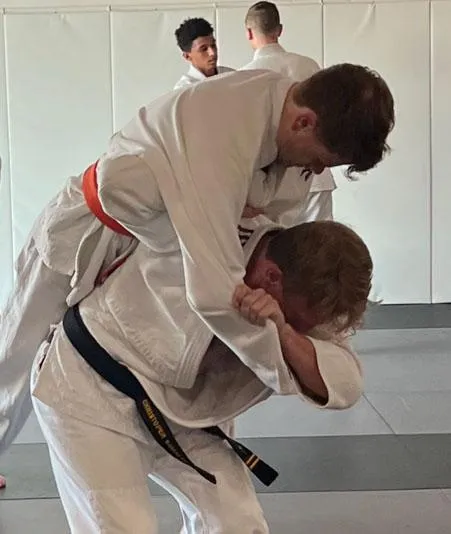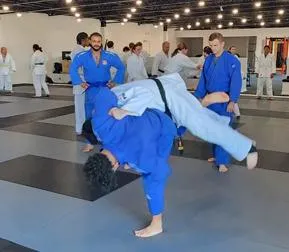317-886-8649
New Wave Jiu Jitsu
🌊Judo Seniors (Ages 13+)
Strength, Skill & Tradition
Step onto the mat and discover the power of Judo, the Olympic martial art that builds physical fitness, mental discipline, and practical self-defense skills in a structured, dynamic environment. Our 90-minute class is designed for teens and adults (13+), blending traditional Judo techniques with modern training methods to develop well-rounded martial artists.
In partnership with Sensei Mario Camacho, New Wave Jiu Jitsu is the home for Hokushin Judo, the top Judo team in the State of Indiana.


Class Highlights
🥋 Core Judo Techniques – Master throws (nage-waza), pins (osaekomi-waza), and submissions (shime-waza/kansetsu-waza)
🔄 Fluid Transitions & Counters – Develop seamless movement between standing (tachi-waza) and ground (ne-waza) techniques
💪 Functional Strength & Conditioning – Improve power, endurance, and flexibility through Judo-specific drills
🧠 Strategy & Timing – Learn kuzushi (balance breaking) and tactical setups for competition or self-defense
🤼 Randori (Live Sparring) – Apply techniques in controlled, progressive resistance training
Why Train With Us?
✅ Expert Instruction – Learn from experienced Judo coaches with competition and teaching backgrounds
✅ Inclusive Atmosphere – All belt levels welcome, from white belts to advanced students
✅ Fitness & Self-Defense – Get in shape while learning practical, real-world applications
✅ Competition Pathway – Optional training for those interested in tournaments
📅 Class Duration: 90 minutes
👊 Ages: 13+ (Teens & Adults)
🎯 All Experience Levels Welcome – Beginner-Friendly!
Whether you're looking for self-defense, competition training, or a challenging full-body workout, our Judo program will push you to grow stronger, sharper, and more confident. The mat is waiting. Will you answer the challenge?
Sign up today and experience the discipline and dynamism of Judo! 🥋🔥
TESTIMONIALS
What our students are saying

"I am so grateful.."
"I am so grateful that my kids have got to be a part of this amazing martial arts studio. The kids not only learn judo/jiu jitsu, but learn respect through their training while having fun and think they are playing and having fun."
- JOSH K.


"We absolutely love it.."
"This place has an amazing atmosphere, plenty of space to roll, very talented instructors, an array of equipment to use! We absolutely love it here and would highly recommend it ❤️"
- KAYLA P.


"..truly skilled at working with kids.."
"We’ve had such a positive experience here! Sensei Mario is absolutely fantastic, so patient, encouraging, and truly skilled at working with kids. My son has grown more confident and disciplined. The environment is supportive and welcoming, and it’s clear that Sensei Mario genuinely cares about each student’s progress. Highly recommend to any parent looking for a great martial arts program for their child!"
- CARMEN D.

Frequently Asked Questions
Judo for Teens and Adults (ages 13+)
Judo is a modern martial art, combat sport, and Olympic event founded in Japan in 1882 by Jigoro Kano. The word "Judo" means "the gentle way," highlighting its philosophical approach to using an opponent's energy against them rather than directly opposing force with force.
Key differences from other martial arts include:
- Focus on throws and takedowns rather than strikes
- Emphasis on competitive sport with Olympic representation
- Progressive resistance training (randori) that allows for full-speed practice
- Balance between standing techniques (tachi-waza) and ground techniques (ne-waza)
- Structured ranking system with colored belts representing progress
At New Wave Jiu Jitsu, our Judo program teaches traditional Kodokan Judo principles while incorporating modern training methods to develop well-rounded martial artists.
Absolutely! Judo is an excellent martial art for beginners of all ages, including teens and adults with no prior martial arts experience.
Our program is designed to accommodate new students by:
- Teaching fundamentals with progressive difficulty
- Focusing on proper ukemi (breakfalls) to ensure safe practice
- Pairing beginners with experienced partners who can guide them
- Providing modified training approaches based on individual fitness and comfort levels
Many of our most dedicated students began with no martial arts background at all. The structure of Judo training allows for steady progression that builds confidence alongside physical skills, making it accessible to everyone regardless of starting point.
Judo offers comprehensive physical, mental, and social benefits for teens and adults:
Physical Benefits:
- Full-body strength development, especially core and lower body
- Enhanced balance, coordination, and body awareness
- Improved flexibility and joint mobility
- Cardiovascular conditioning through dynamic training
- Practical self-defense skills
Mental Benefits:
- Enhanced focus and concentration
- Stress relief and mental resilience
- Strategic thinking and problem-solving skills
- Confidence and self-discipline
- Perseverance and grit
Social Benefits:
- Community of supportive training partners
- Respectful interaction with people of all ages
- Opportunities for mentorship and leadership
- Cultural appreciation of Judo's Japanese heritage
Judo's philosophy of "maximum efficiency with minimum effort" and "mutual welfare and benefit" extends beyond the mat into all aspects of life.
No, you're not too old or out of shape to start Judo! This is one of the most common concerns, but our Judo program welcomes students of all fitness levels and ages.
Here's how we accommodate different starting points:
- Training intensity scales to your current fitness level
- Fundamental techniques focus on efficiency rather than raw strength
- Breakfalls (ukemi) are taught progressively to ensure safety
- Our coaches provide modifications for those with physical limitations
- We have successful students who began in their teens, 20s, 30s, 40s, and beyond
Judo is unique in that technical proficiency can often overcome physical attributes. Many students find that Judo actually becomes the catalyst for improving their overall fitness and health as they progress.
We recommend starting at your own pace and communicating any concerns with our instructors, who are experienced in helping new students adapt to the training.
Safety is a top priority in our Judo program. While Judo is a contact sport involving throws and groundwork, we implement numerous safety measures to minimize risk:
- Thorough teaching of ukemi (breakfalls) before advancing to throws
- Quality tatami mats that absorb impact
- Progressive training methods that match students with appropriate partners
- Strict dojo etiquette that emphasizes mutual respect and safety
- Regular equipment checks and facility maintenance
- Instructors trained in first aid and injury prevention
Like any physical activity, Judo carries some inherent risk of injury. However, our structured approach to teaching and careful supervision significantly reduces these risks. Most injuries in Judo are minor (bumps, bruises, muscle soreness) and serious injuries are rare, especially when proper technique and safety protocols are followed.
For teens, we take additional care to ensure training is appropriate for their stage of physical development.
Our Judo program effectively accommodates students of varying skill levels through several approaches:
- Structured class format with fundamentals beneficial for all levels
- Technique instruction that includes basic and advanced variations
- Partner training where more experienced students help newer ones
- Randori (free practice) groupings based on size, age, and experience
- Progressive technical curriculum that builds sequentially
In Judo, there's a concept called "Jita Kyoei" (mutual welfare and benefit) that guides our training philosophy. More experienced judoka help beginners, which reinforces their own technical understanding while helping newer students advance.
We also offer some specialized training sessions for competitors or advanced students, but our regular classes are designed to benefit everyone from first-day beginners to experienced black belts.
Judo techniques are categorized into several main groups:
Nage-waza (Throwing Techniques):
- Tachi-waza (Standing techniques)
- Te-waza - Hand techniques like Seoi-nage (shoulder throw)
- Koshi-waza - Hip techniques like O-goshi (major hip throw)
- Ashi-waza - Foot/leg techniques like Osoto-gari (major outer reap)
- Sutemi-waza (Sacrifice techniques) where you give up your balance to execute a throw
Katame-waza (Grappling Techniques):
- Osae-waza - Pins and holds
- Shime-waza - Choking techniques (for appropriate age/rank)
- Kansetsu-waza - Joint locks (for appropriate age/rank)
Additional Training Elements:
- Ukemi - Breakfalls (vital for safety)
- Kuzushi - Off-balancing principles
- Kata - Formal demonstration patterns of techniques
- Randori - Free practice/sparring
- Shiai - Competition practice
At New Wave Jiu Jitsu, we teach these techniques progressively, ensuring students master fundamentals before advancing to more complex movements. For teens and adults, the full curriculum is available as they progress through the ranks.
Yes! Competition is an integral but optional part of Judo training. At New Wave Jiu Jitsu, we support students interested in competing while respecting those who prefer to train without competition.
For those interested in competition:
- Local, regional, and national tournaments are available
- Competitions are divided by age, weight, and experience level
- Dedicated competition preparation sessions
- Coaching support at competitions
- Clear pathway from novice tournaments to advanced competition
Competition benefits include:
- Testing skills under pressure
- Building mental resilience
- Accelerated technical development
- Goal setting and achievement
- Camaraderie with teammates and the broader Judo community
For teens especially, competition provides valuable life lessons in sportsmanship, handling both victory and defeat with grace, and performing under pressure. Our instructors will discuss when you're ready to compete and help prepare you for the experience.
Judo's benefits extend far beyond the mat and translate directly to academic and professional success:
For Students (High School/College):
- Improved focus and concentration for studying
- Stress management during exam periods
- Time management skills from balancing training and academics
- Discipline and consistent effort that transfers to schoolwork
- Confidence in handling challenging situations
- Potential scholarship opportunities for collegiate Judo athletes
For Working Professionals:
- Stress relief after demanding workdays
- Improved decision-making under pressure
- Better physical health leading to fewer sick days
- Mental resilience for handling workplace challenges
- Leadership skills developed through training and helping others
- Network building with other professionals in the Judo community
Judo's philosophical principle of "maximum efficiency with minimum effort" teaches practitioners to find optimal solutions to problems—a valuable approach in any academic or professional setting. Additionally, the mental clarity that comes from regular physical training has been shown to enhance cognitive function and productivity.
For your first Judo class at New Wave Jiu Jitsu, here's what you'll need:
Essential Items:
- Athletic clothes - T-shirt and sweatpants or athletic shorts
- Water bottle
- Small towel
- Flip-flops or slides (for walking to/from the mat area)
- Any necessary medical items (inhaler, etc.)
What NOT to Bring/Wear:
- Jewelry or watches (must be removed before training)
- Clothes with zippers, buttons, or pockets
- Shoes on the mat
- Valuable items (we have limited secure storage)
For your first few classes, you don't need a Judo gi (uniform). After deciding to continue, we recommend purchasing a proper judogi. Our instructors can provide recommendations for quality, affordable options.
Before coming to class:
- Trim fingernails and toenails
- Remove all jewelry
- Eat a light meal 1-2 hours before class (not immediately before)
- Arrive 15 minutes early to complete any paperwork and meet the instructor
Most importantly, bring a positive attitude and willingness to learn!
Judo has a prestigious history as an Olympic sport:
- First included as a demonstration sport in the 1932 Los Angeles Olympics
- Became an official Olympic sport for men at the 1964 Tokyo Olympics
- Women's Judo was added as a demonstration sport in 1988, becoming official in 1992
- Today features seven weight categories each for men and women
- Consistently ranks among the most-watched Olympic combat sports
Olympic Judo has influenced the sport's development worldwide, bringing standardized rules and increased popularity. Modern Olympic Judo emphasizes dynamic throwing techniques and groundwork that leads to submissions or pins.
The Olympic connection means that Judo has a clear competitive pathway:
- Local and regional tournaments
- National championships
- Continental championships
- World championships
- Olympic qualification events
- Olympic Games
At New Wave Jiu Jitsu, we teach Olympic-style Judo while honoring traditional aspects of the art. For dedicated competitors, our instructors can provide guidance on the competitive pathway and development opportunities that could eventually lead to national-level competition.
To make consistent progress in your Judo journey, consider these key recommendations:
- Consistent attendance - Regular practice is crucial; 2-3 sessions per week is ideal for steady improvement
- Proper ukemi practice - Mastering breakfalls not only prevents injury but enables you to be a better training partner
- Focus on fundamentals - Perfect basic techniques before pursuing flashy moves
- Train with various partners - Different body types and skill levels help develop adaptability
- Maintain a learning mindset - Be open to feedback and willing to make adjustments
- Supplemental conditioning - Additional strength and flexibility work supports your Judo development
- Study the art - Watch competition videos, read books on Judo, learn its history and philosophy
- Attend seminars - Learn from visiting experts when opportunities arise
- Competition experience - Even if not your primary goal, competition accelerates learning
- Patience and perseverance - Progress in Judo comes in bursts between plateaus; consistency is key
Our instructors will provide guidance tailored to your individual needs, strengths, and areas for improvement. Remember that Judo is a lifelong journey—many practitioners continue to develop and refine their skills for decades.
We encourage students to set both short-term and long-term goals, whether related to technical development, competition success, rank advancement, or personal growth.

New Wave Jiu Jitsu
© Copyright 2025 New Wave Jiu Jitsu. All rights reserved.